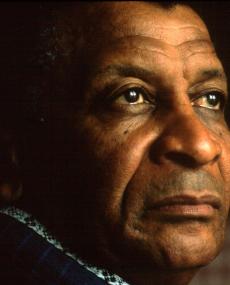
South African musician, Abdullah Ibrahim was born on the 9 October 1934 in Cape Town, South Africa. Born Adolph Johannes Brand, he converted to Islam in 1968 during his pursuit for a more peaceful and fulfilling spiritual life. Ibrahim is known for his influence in jazz music as a pianist and composer, where some of his own earliest inspirations included his grandmother, who was a pianist for the local African Methodist Episcopalian church as well as his mother who led the choir. Here, traditional African Khoi-san songs and Christian hymns would be the birth of his love for music.
At the age of seven, he began taking piano lessons, making his first live professional debut at the age of fifteen and later recording with local groups such as the Tuxedo Slickers. After completing his matric, he worked as a school teacher, however he soon quit his job and went on to study music at The University of Cape Town. During his studies, he felt what he was learning was not to his taste or preference in music and soon after left the University. At the very core of Cape Town that saw a variety of culture and color, modern and traditional, he began to develop his own unique style in music using these influences as a stepping stone. In 1958, Dollar Brand Trio was formed and in 1959, his revolutionary septetthe Jazz Epistles was formed and they recorded the first jazz album done by South African Musicians. The band included musicians such as Hugh Masekela, Johnny Gertze, KippieMoektsi, MakayaNtshoko and Jonas Gwana.That same year he met vocalist Saithima Bea Benjamin whom he performed with and later married.
At the very peak of apartheid, Dollar Brand accepted a 3-year recording contract in Zurich, Switzerland at Club Africana in 1962, leaving South Africa in hopes for a greater platform for their music. In 1963, Saithima Benjamin convinced legendary musician Duke Ellington to listen to the band play at Club Africana, which then led to a recording session – Duke presents the Dollar Brand Trio - in Paris, and multiple requests to perform on television, radio and European festivals for the following two years. Shortly after, the newly married couple moved to New York where Dollar Brand made a performance appearance at the Newport Jazz Festival and Carnegie Hall in 1966 and was then offered a lead substitute position in the Ellington Orchestra as well as touring with the Elvin Jones Quartet for six months.
In 1967, Rockefeller Foundation presented him with a grant to attend the Julliard School of Music, during which he had the opportunity to meet and work with musicians such as Don Cherry, John Coltrane, Cecil Taylor, Ornette Coleman and Archie Shepp to name a few. After his conversion to Islam in 1968, Abdullah practiced spiritual discipline through music and martial arts. He then founded his music school in Swaziland, spent two years there and in 1973 he returned to Cape Town together with his family. During this time he continued to tour internationally with Dollar Brand and in 1974 recorded “Mannenberg – ‘Is where it’s happening’” which became an off-the-record anthem for black South Africans. In 1976, following the Soweto Student Uprising, Abdullah arranged an illegal ANC benefit concert; shortly after, he returned again to New York with his family.
Abdullah’s career began to thrive in the 1980’s when he founded his record company, Ekapa, alongside his wife as well as the septet, Ekaya. He was also involved in multiple projects that were influenced by his music such as Garth Fagan’s ballet Prelude, the Kalahari Liberation Opera and a 1983 musical that took place in Cape Town. One of the biggest concerts he played at was in Central Park that commemorated Nelson Mandela’s 70th birthday; he then also performed at Mandela’s inauguration in 1994. Abdullah continued to travel and perform between the 90’s and 2000’s and will be celebrating his 83rd birthday this year. He holds music at his core proclaiming still, the title of a musician and continues to create and work on new projects as he claims, “some do it because they have to do it, we do it because we want to… so we have to do it.” Holding a martial arts Black Belt, he visits Japan as often as he can to spend time with his master. With such an innovative spirit and an exceptional musical skill and capability, Abdullah remains a true definition of a professorand a student in both his personal life and musical career.
Major Works
· Between 1965 and 1968, he released four albums including, ‘Anatomy of a South African Village’,’ This is Dollar Brand’, ‘The Dream’, and ‘HambaKhale’ with Gato Barbieri.
· Ibrahim composed the 1974 album, ‘Mannenberg - "Is Where It's Happening"’ consisting of two long cuts "Mannenberg" and "The Pilgrim" became a great hit. Mannenburg became the anthem of those fighting against apartheid.
· His 1999 album, ‘African Suite’ backed by the Youth Orchestra arranged by Daniel Schnyder was a reworking of Ibrahim’s compositions, and reflective of his South African origin, Islamic faith, European residence, and jazz passion.
· From 2002 to 2009, he released albums including ‘Cape Town Revisited’ ‘EkapaLodumo’, ‘African Magic’, ‘Senzo’, and ‘Bombella’. These albums revisited some of his earlier works and also presented new tunes